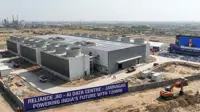Batting for Bharat: Crisil
02 Feb 2017
The Budget, under the current circumstances, has done a good job of furthering the government's agenda on financial inclusion and enhancing economy's long-term growth potential, according to a CRISIL report.
''The imprimatur of Bharat is unmissable in the Budget,'' it said, adding the primary motivation of the Union Budget this time was to revive fortunes in the hinterland by bolstering the agricultural economy and rural infrastructure. This is also evinced in higher allocations for MNREGA and the Pradhan Mantri Awas Yojana, among others.
Increase in credit availability, the focus on micro-irrigation and dairy-related activity, making farm incomes more predictable - all will have an upshot of bolstering rural incomes and support consumption demand, which should benefit makers of consumer goods and durables, two-wheelers and tractors.
Increased outlays on roads, housing, sanitation and electrification through various schemes would make a difference in rural livability. In the process, there would be significant opportunity to the construction, cement and metals sectors.
In terms of infrastructure build-out, the focus is largely on transportation, especially railways and roads. There is a nearly 10 per cent increase in budgetary allocation to infrastructure, including 24 per cent increase for national highways. Upgrading connectivity and improving logistical efficiencies have excellent multiplier effects.
For urban India, there is an 80 per cent increase in allocation towards metro rail. While new policy framework to encourage private sector investments in the sector is expected to facilitate faster execution of projects, land acquisition and multiplicity of approvals remain key challenges, it added.
This focus on transport infrastructure is expected to boost construction, engineering, metals, cement and logistics sectors. Over the longer term it should help reduce logistics costs and improve efficiencies, both of which are critical for the manufacturing sector to be competitive.
Investment in building a strong broadband digital infrastructure is set to improve coverage and quality of service in rural India. This is critical to the expansion of the digital economy, especially for financial transactions, government welfare schemes and education.
Allocation under the BharatNet programme has been budgeted at Rs 100 billion, which marks a near-two-thirds increase over the previous year. This, in turn, provides a significant opportunity for the telecom sector.
The various initiatives announced for the real estate sector are expected to ease funding for affordable housing projects, provide tax relief to developers with unsold inventory, and support demand on the back of a softening rate environment. Deferment of payment of capital gains in case of joint development agreements is expected to benefit land owners, making them a preferred model of development, it added.




















